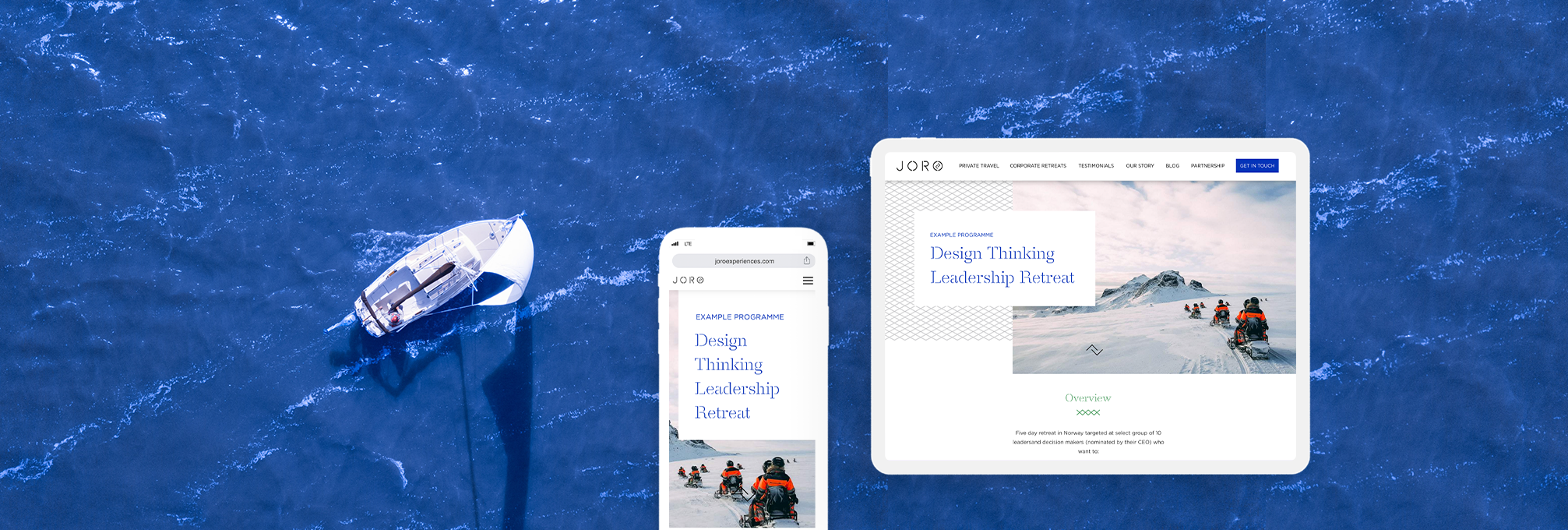

Joro Experiences Corporate Retreats
Client
Joro Experiences
Joro is a travel company that creates extraordinary experiences and they exist to help people find different ways of discovering the world.
Their approach is both collaborative and critical. tailoring experiences to their client’s interests and motivations, while taking the logistics off their hands.
My Role
Product Design
Summery
“I have helped the business to explore how they can better position themselves on the market. Proposing how they can communicate their value aligned with their consumer’s goals.”

STAGE 1
Discovery Process
Brief
Because of the global pandemic, we feel there is an additional need to focus on how Joro Experiences can work with corporate clients to build bespoke trips/retreats or as a potential product. And expand their offering.
Problem
People are not aware of what is their new offering and how it can befit them in a long term. So that Joro can attract more potential leads to sign in.

Project Goals
POSITIONING
Understand how Joro can position on the market, so they can stand out from their competitors.
AWARENESS
How to bring awareness of their new services as well as communicate their value proposition.
LEADS ON BOARD
Get leads on board. Who are from both target groups. HRs hiring their services and Leads as partners to collaborate together
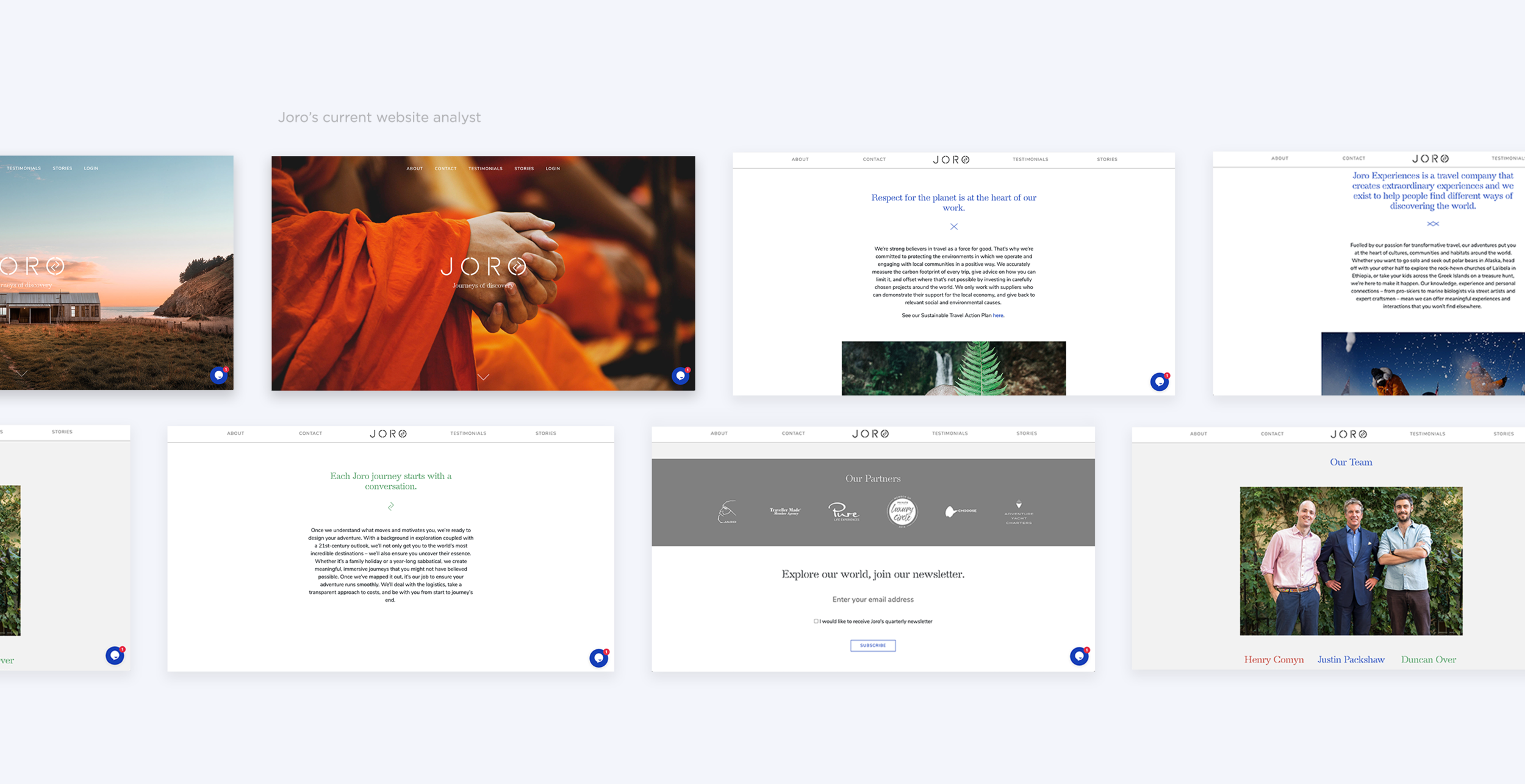

Approach
I’ve deep dive to clearly understand what are the stakeholder’s expectations and needs. What are the key challenges they’ve had in the past? But I also wanted to understand what are other problems they have with their existing website.
Researching their competitors so I can better understand how they communicate their business value proposition on their platform. But also how they differentiate themselves from each other. And create a market positioning graph so I can know which key elements I have to emphasise to help them stand out and communicate better their value proposition
Research Methods
I’ve gone through the complete end-to-end product development process but the key steps that help me defined the problem solution was:
Stakeholders Interviews
Persona
Decision Behaviour
Assumptions Validation
Users Interviews
Customer journey
Prototype testing
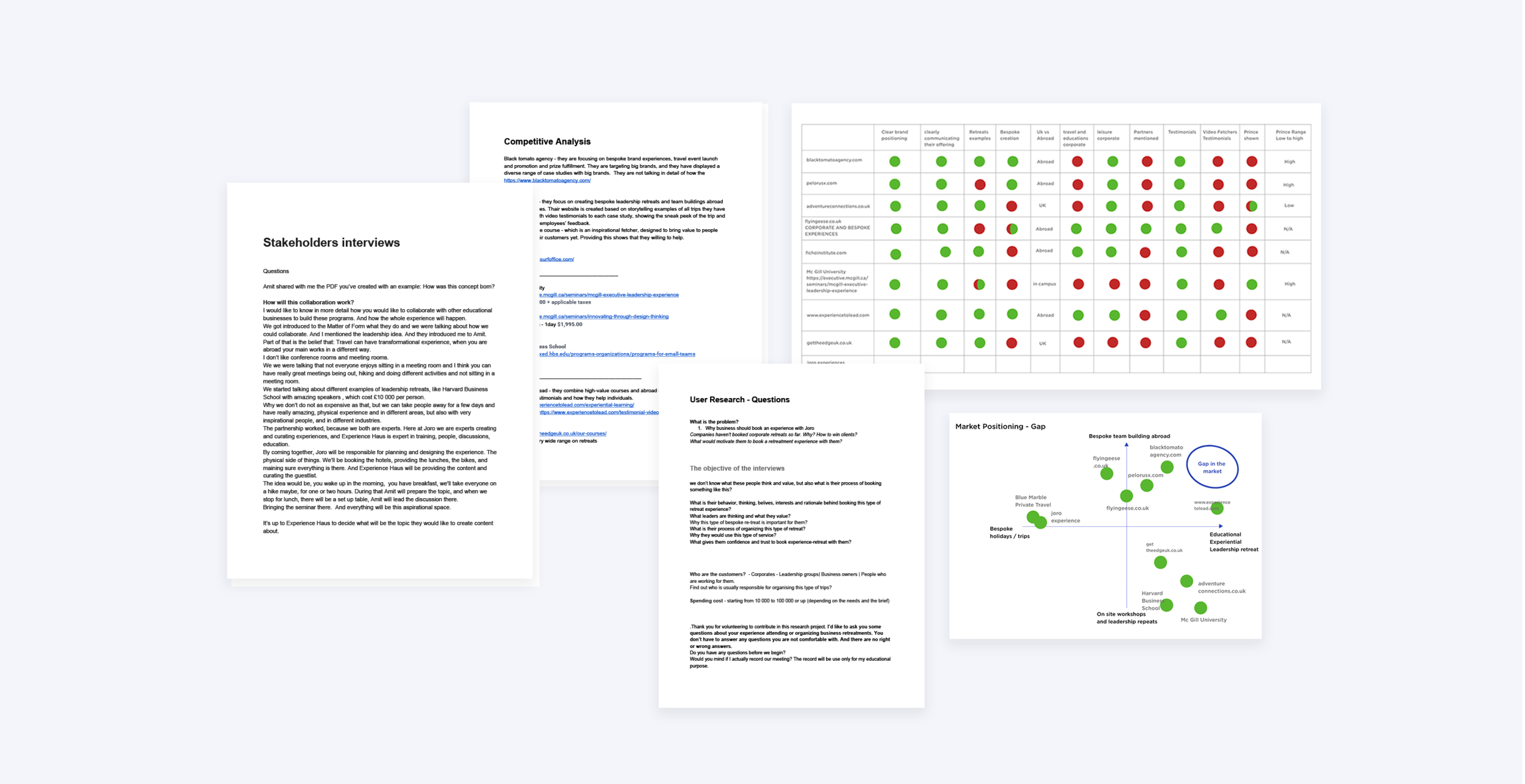
Stakeholders meeting
IDENTIFYING THE TARGET AUDIENCE
From the stakeholder’s meeting, understanding how they would like to expand their business, I’ve identified two types of customers that will be engaging with their platform.
HRs from big corporates will be booking and hiring this type of service for their Senior Leadership groups in their organisation.
Educational institutions that are specialists and leaders in training leaders.
WHY
Because of the global pandemic, Joro is looking to expand its business offering. They’ve started exploring the concept of offering leadership programs abroad, combining extraordinary experience with training and educational purpose. In order to achieve this successfully, they need to attract lead instructors to collaborate with them as well as big corporates who are interested to hire their services.
Users Interviews & Personas
CHALLENGES
finding users due to the global pandemic, but the plan was to move forward with minimum viable users research but also to continue doing more interviews later in the process. And proving all assumptions I might have.
PLANNING
and finding relevant users who can help me understand:
what is their decision behaviour and needs?
how they find partners
what they value and how they hire specific type of services.
KEY TAKEAWAYS
They need to clearly understand:
what is their offering and how this will benefit them in a long term.
providing research insights and proven statistics for return on investment.
clear value proposition and offering
collaborative support
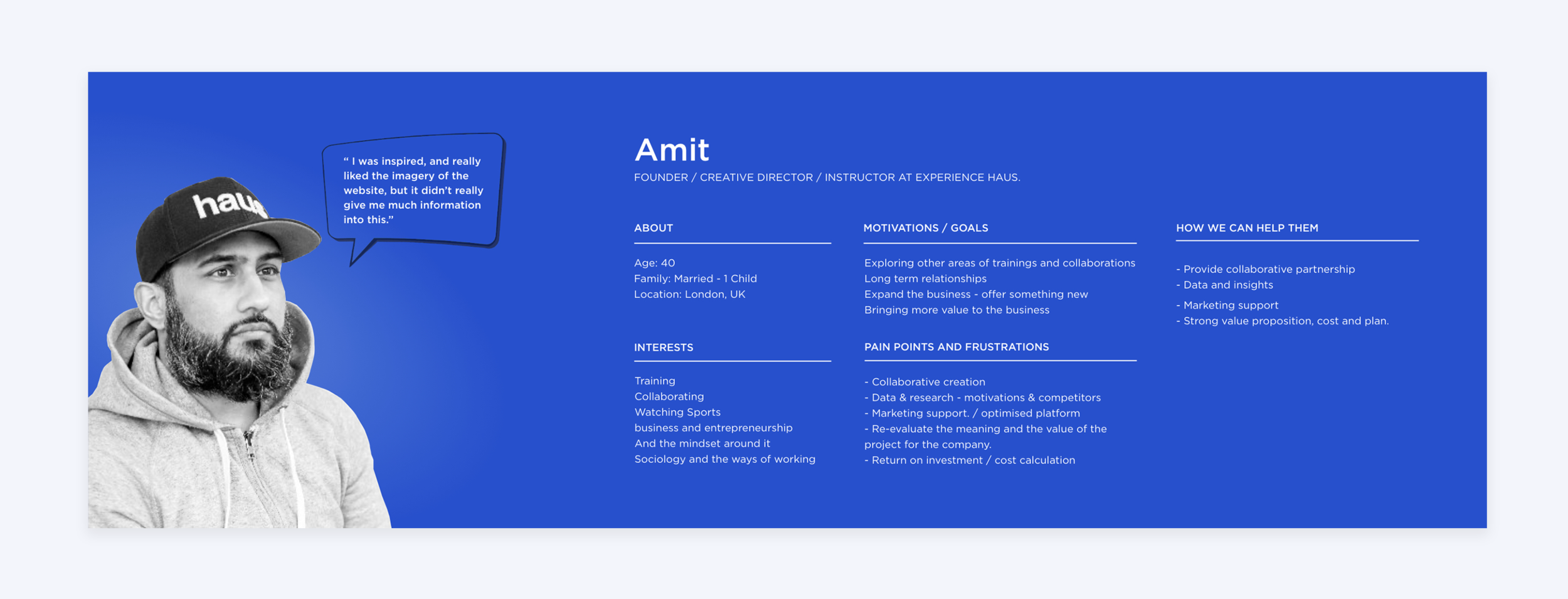

Defining the real problem
Business Problem
Joro Experiences needs a way to showcase their reliability to help and collaborate business retreats so they can better attract educational partners and large corporates.
Users Problem
People are not aware of what is their new offering and how it can befit them in a long term. So that Joro can attract more potential leads to sign in

STAGE 3
The process of defining the solution
Affinity Mapping, Experience Map, User Stories & Features Prioritisation
Mappings: Proving & Learning
Since I’ve analysed what are the real user’s problems using the Affinity Mapping, User Stories and Experience Mapping methods, the learning is:
The key steps in the user journey are when “Selecting Company” & “Shortlisting”
It’s really important how the business is communicating their unique value proposition so that people can confidently contact the business.
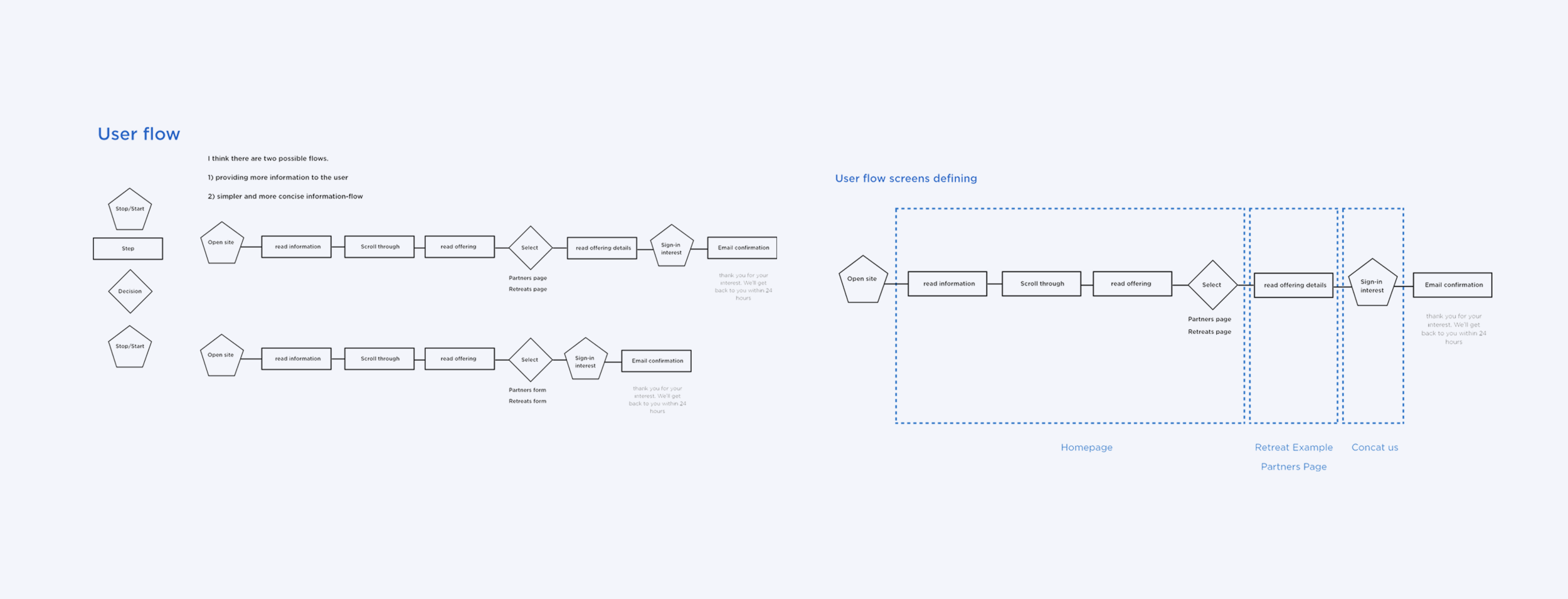

STAGE 4
Solution process & thoughts
Below you can find the key stage of the project, that helped me to define the overall feature-content prioritisation.
All features in the must category are predominantly content modules which I organised based on the user’s/customer’s decision behavior and needs.
Decision Behaviour Thinking - Site Structure
I’ve created the graph based on the customers needs narrative thinking. People usually spend seconds deciding subconsciously whether the platform/product is something they need. That’s why I’ve used all insights from the user research to create the decision behaviour content mapping, so I can organise the site structure in a functional and easy to consume way.
I’ve created separate decision behaviour content mapping for each of the pages from the User flow. Which I tested later on in the usability testing phase.

STAGE 5
Design Process
Ideating, Sketching & Exploring | Wireframing | High fidelity prototype

Defining the MVP
The initial design layout is structured based on the decision behaviour map and the user flow pages structure. I’ve designed two possible layouts for the user journey site flow, which I tested with potential users
The difference between the two MVPs was whether to include the module at the bottom separating the contact us form in two: for Partners and for Retreat creation.


Usability Testing
OBJECTIVE
To find out if the design and the content structure will allow users to be confident to book a retreat and to sign in their interest/enquiry.
PROCESS
Tested the prototype with 6 users for a week, remotely.
OUTCOME
Users successfully completed all tasks and requested a quote
Removing some of the information
People expected to find some of the information upper on the page.
Bring more personality
Credibility assumptions were validated

— Users said
“If I’ve got a partnership in mind I would like to speak with someone from their team. Who is looking after their partnership?”


Final MVP
Responsive design using Joro’s brand elements, to design a consistent experience. Since adding more services and expanding the business offering the navigation bar had to be slightly adjusted, so the information can be better balanced and users can navigate easier on the platform. As well as removing some colour bocks from the initial prototype exploration.

Example Retreat Page
The page is including modules structured in a visual hierarchy based on a decision-making thinking narrative. I’ve incorporated bold full-screen images to support the retreat story, but also to help communicate their unique value proposition. The design also concise subtle brand pattern elements, which help the overall layout to feel friendlier and to support the content organising.

Partnership Page
The final MPV is structured and modified based on the usability testing insights. Showing more personality, because people wanted to see, who, they will collaborate with. As well as providing some valuable information around the innovative ways of training and creating corporate retreats.
What’s next
- Adding FAQ page
- Adding relevant interactions & Videos
- Implementing a quote boot
- Deciding on the type of retreats examples
- More testings
Learning
Sometimes we need to experiment more and think outside of the box and use other methods, that are not being necessary established. Such as the decision behavior mapping, so that we can define the final solution and validate why the site structure needs to be designed in this way.











